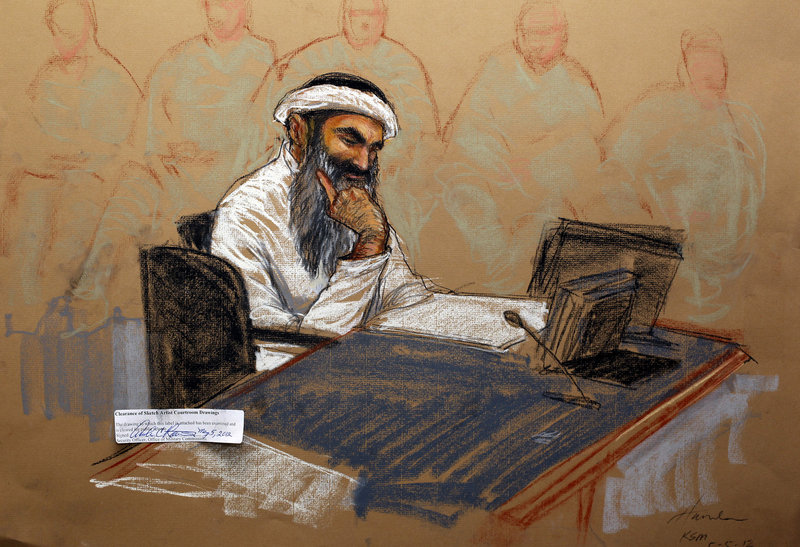GUANTANAMO BAY NAVAL BASE, Cuba – They knelt in prayer, ignored the judge and wouldn’t listen to Arabic translations as they confronted nearly 3,000 counts of murder. The self-proclaimed mastermind of the Sept. 11 attacks and four co-defendants defiantly disrupted an arraignment that dragged into Saturday night in the opening act of the long-stalled effort to prosecute them in a military court.
Their refusal to participate in the hearing helped bring their arraignment to a crawl. It took more than eight hours for the judge at the U.S. military base in Cuba to ask the men to enter pleas to 2,976 counts of murder and terrorism in the 2001 attacks that sent hijacked jetliners into New York’s World Trade Center and the Pentagon.
The men put off their pleas until a later date and lawyers were still discussing trial dates Saturday night.
Khalid Sheikh Mohammed, the admitted 9/11 architect, cast off his earphones providing Arabic translations of the proceeding and refused to answer Army Col. James Pohl’s questions or acknowledge he understood them. All five men refused to participate in the hearing; two passed around a copy of The Economist magazine and leafed through the articles.
Walid bin Attash was confined to a restraint chair when he came into court, released only after he promised to behave.
Ramzi Binalshibh knelt in prayer alongside his defense table with Ali Abd al-Aziz Ali in the middle of the hearing, then launched into an incoherent tirade about the late Libyan leader Moammar Gadhafi and declared he was in danger. “Maybe they will kill me and say I committed suicide,” he said in a mix of Arabic and broken English.
The detainees’ attorneys spent hours questioning the judge about his qualifications to hear the case and suggested their clients were being mistreated at the hearing, in a strategy that could pave the way for future appeals.
It was the defendants’ first appearance in more than three years after stalled efforts to try them for the terror attacks, in which hijackers steered four commercial jets into the World Trade Center, the Pentagon and a western Pennsylvania field. Nearly 3,000 people were killed.
The defendants’ behavior outraged 9/11 family members watching on closed-circuit video feeds around the United States at East Coast military bases. One viewer shouted, “C’mon, are you kidding me?” at the Fort Hamilton base in Brooklyn.
“They’re engaging in jihad in a courtroom,” said Debra Burlingame, whose brother, Charles, was the pilot of the plane that flew into the Pentagon. She watched the proceeding from Brooklyn.
The Obama administration renewed plans to try the men at the U.S. base at Guantanamo Bay after a bid to try them in New York City blocks from the trade center site faced political opposition. It adopted new rules with Congress that forbade testimony obtained through torture or cruel treatment, and argued the defendants could be tried as fairly here as in a civilian court.
Human rights groups and defense lawyers say the secrecy of Guantanamo and the military commissions, or tribunals, will make it impossible to defend them. They argued the United States kept the case out of civilian court to prevent disclosure of the treatment of prisoners like Mohammed, who was waterboarded 183 times.
Mohammed’s civilian attorney, David Nevin, said he believed Mohammed was not responding because he believes the tribunal is unfair. Jim Harrington, representing Binalshibh, said his client would not respond to questions “without addressing the issues of confinement.”
Cheryl Bormann, a civilian attorney for bin Attash, appeared in a conservative Islamic outfit that left only her face uncovered and asked the court to order other women present to wear “appropriate” clothing so that the defendants do not have to avert their eyes “for fear of committing a sin under their faith.”
Pohl warned he would not permit defendants to block the hearing. He brought translators into court to interpret the proceedings live once the men refused to use earpieces and tried to stick to the standard script for tribunals, asking the defendants if they understood their rights to counsel and would accept the attorneys appointed for them. The men were silent.
Copy the Story Link
Send questions/comments to the editors.



Success. Please wait for the page to reload. If the page does not reload within 5 seconds, please refresh the page.
Enter your email and password to access comments.
Hi, to comment on stories you must . This profile is in addition to your subscription and website login.
Already have a commenting profile? .
Invalid username/password.
Please check your email to confirm and complete your registration.
Only subscribers are eligible to post comments. Please subscribe or login first for digital access. Here’s why.
Use the form below to reset your password. When you've submitted your account email, we will send an email with a reset code.